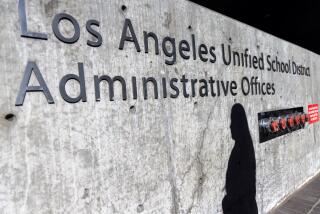Hastert indictment casts spotlight on days as teacher, claims of sex abuse
- Share via
Indicted former U.S. House Speaker Dennis Hastert was paying off a man to conceal sexual abuse from decades earlier, when Hastert taught and coached at a high school in Chicago’s far west suburbs, federal law enforcement sources said Friday.
Federal agents also have interviewed a second person who raised similar allegations of sexual abuse against Hastert that corroborated the account of the initial alleged victim, another law enforcement source said.
The new details came a day after federal prosecutors in Chicago announced the stunning charges accusing the Republican powerhouse of paying more than $1.7 million in apparent hush money to an acquaintance who once lived in Yorkville, where Hastert taught and coached wrestling from 1965 to 1981.
One law enforcement official said Hastert was making the payments to conceal his past relationship with the man, identified in the indictment only as Individual A.
“It was sex,” said the source, who would not speak publicly about the charges.
Another federal law enforcement official, when asked if the misconduct involved sexual abuse, said, “That’s correct.”
A third law enforcement official said Individual A had been a student at Yorkville High School but did not know if he was on the school’s wrestling squad coached by Hastert. Agents spoke with a second person who raised similar allegations of abuse against Hastert, the official said, but investigators didn’t find any “pattern of payments” to that individual by Hastert.
“But the case is still going on,” the official said.
The revelations still left many questions unanswered and a brewing media frenzy Friday as reporters mined clues in the government’s carefully worded, seven-page indictment that described Individual A as someone who has known Hastert nearly all the person’s life.
Adding to the intrigue, Hastert wasn’t seen or heard from for a second day, even as reporters swarmed outside his sprawling Plano estate, knocked on doors to his offices and interviewed his former colleagues and constituents.
And no attorney had publicly emerged on behalf of Hastert to deny the charges, unlike most high-profile cases in which defense lawyers quickly come forward to profess a client’s innocence to the media or say they were looking forward to their day in court.
The former longtime legislator’s bios disappeared from websites of two entities he resigned from Thursday soon after the charges were announced — the Chicago-based CME Group, which owns both the Chicago Mercantile Exchange and Chicago Board of Trade, as well as Washington lobbying firm Dickstein Shapiro.
He also resigned from the board of advisers to Wheaton College’s public policy center, named in honor of Hastert, who is an alum.
Authorities did not arrest Hastert when the indictment was unsealed, instead allowing him to come in on his own at a later date for an arraignment at the Dirksen U.S. Courthouse in Chicago. A date for that hearing had not been set as of Friday.
In a routine move Thursday, U.S. Magistrate Judge Geraldine Soat Brown ordered that when Hastert appears in court, he be freed pending trial without having to post any money unless prosecutors object, court records show.
The indictment of Hastert, 73, marks the most significant charges brought since U.S. Attorney Zachary Fardon took office in 2013. But in keeping with Fardon’s low-key style, the blockbuster announcement wasn’t made at a news conference but was issued late Thursday afternoon by news release.
Given Hastert’s stature, the indictment needed approval at the highest levels of the U.S. Justice Department. Still, the charges were kept under wraps even within the U.S. Attorney’s Office in Chicago, where veteran prosecutors said they were surprised to learn Hastert was a target less than an hour before the charges were made public.
Instead of the bribery counts more typical for high-profile cases involving politicians, the indictment of Hastert centers on an obscure charge, the illegal structuring of bank withdrawals over 4 1/2 years to allegedly conceal the $1.7 million in payoffs.
Hastert also was charged with lying to FBI agents who questioned him about the withdrawals in December.
The case was randomly assigned to U.S. District Judge Thomas M. Durkin, a former federal prosecutor whose brother, Jim Durkin, is the Republican leader of the Illinois House.
In 13 years at the U.S. Attorney’s Office in Chicago, Durkin rose to first assistant and prosecuted numerous high-profile cases, including the trial of former Illinois Gov. Dan Walker on bank fraud charges. Walker was convicted and served 18 months in prison.
Durkin also helped lead the landmark Operation Gambat probe of 1st Ward corruption and mob ties, winning convictions of former Ald. Fred Roti, former state Sen. John D’Arco and former Cook County Chancery Court Judge David Shields through the undercover work of corrupt lawyer Robert Cooley.
Robert Loeb, a veteran criminal defense attorney and former Cook County prosecutor, said he saw no obvious ethical issues with Durkin’s family connections to state Republicans but that there was always the possibility of a recusal due to an “appearance of impropriety.”
“If it would taint how the public might view the integrity of the process, then somebody might want to think about getting it moved to a different judge,” Loeb said.
According to the indictment, from June 2010 to April 2012, Hastert made 15 withdrawals of $50,000 each from bank accounts he controlled and paid Individual A that cash about every six weeks. After bank representatives questioned Hastert about the withdrawals in 2012, he began illegally structuring the cash withdrawals in increments less than $10,000 to evade bank reporting requirements, the indictment said.
Between July 2012 and December 2014, Hastert made in excess of 100 withdrawals, all under $10,000 each, the indictment charged. Those withdrawals totaled some $952,000 in cash, prosecutors alleged.
When questioned by FBI agents in December about the withdrawals, Hastert said he was trying to store cash because he didn’t feel safe with the banking system, according to the charges.
“Yeah ... I kept the cash. That’s what I’m doing,” Hastert was quoted as saying to the agents.
Serrano and Phelps reported from the Tribune’s Washington bureau. Meisner is a Tribune reporter in Chicago.
jmeisner@tribpub.com
Twitter @jmetr22b
More to Read
Sign up for Essential California
The most important California stories and recommendations in your inbox every morning.
You may occasionally receive promotional content from the Los Angeles Times.















